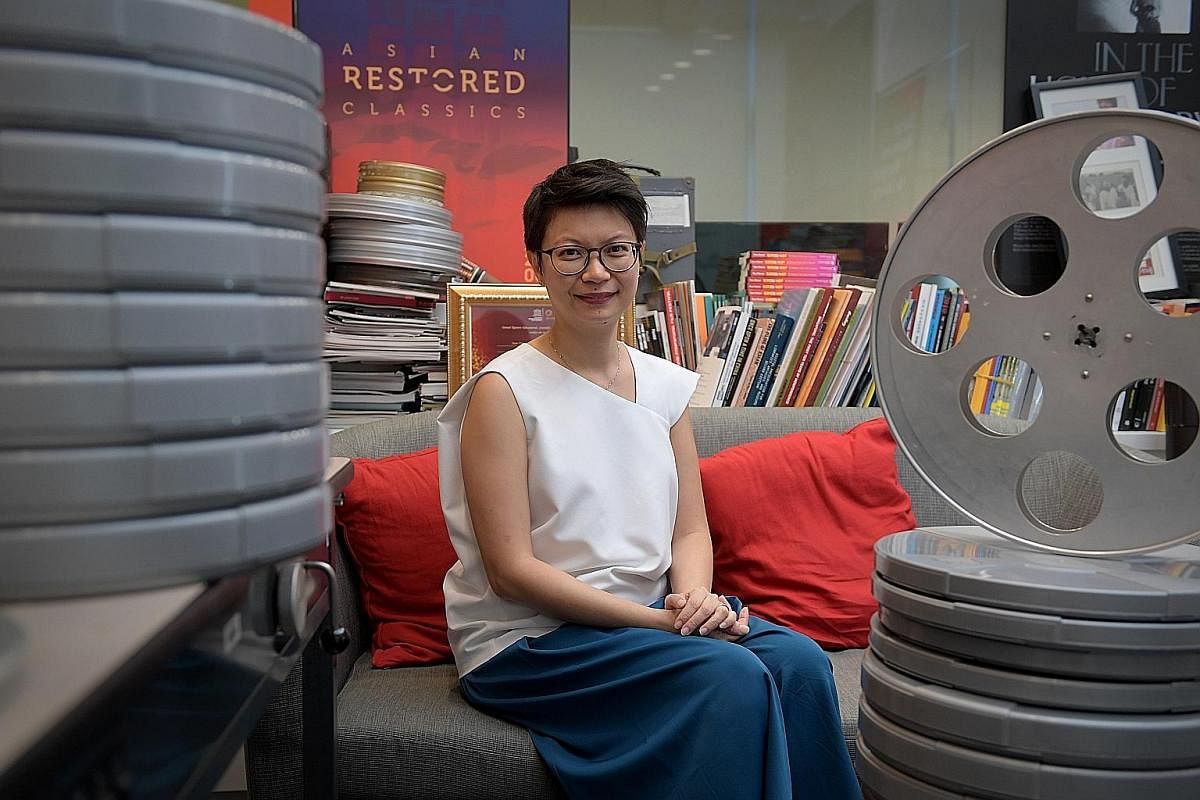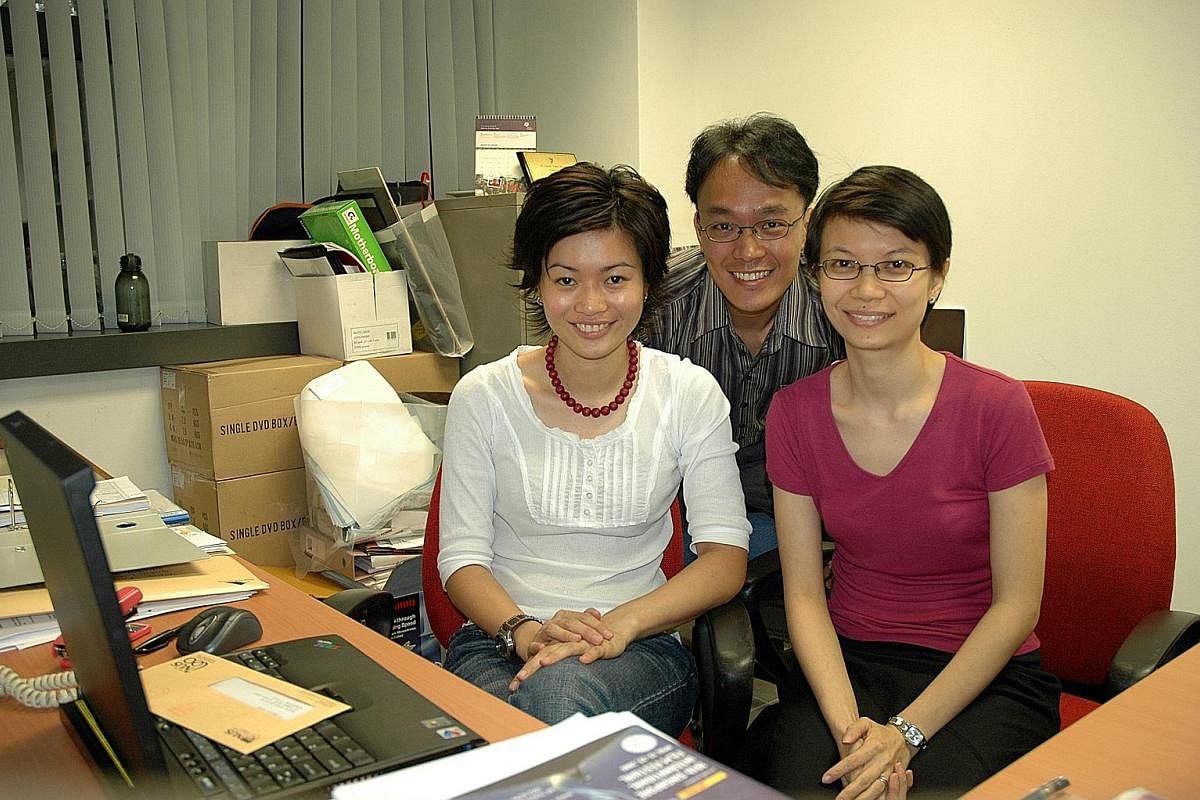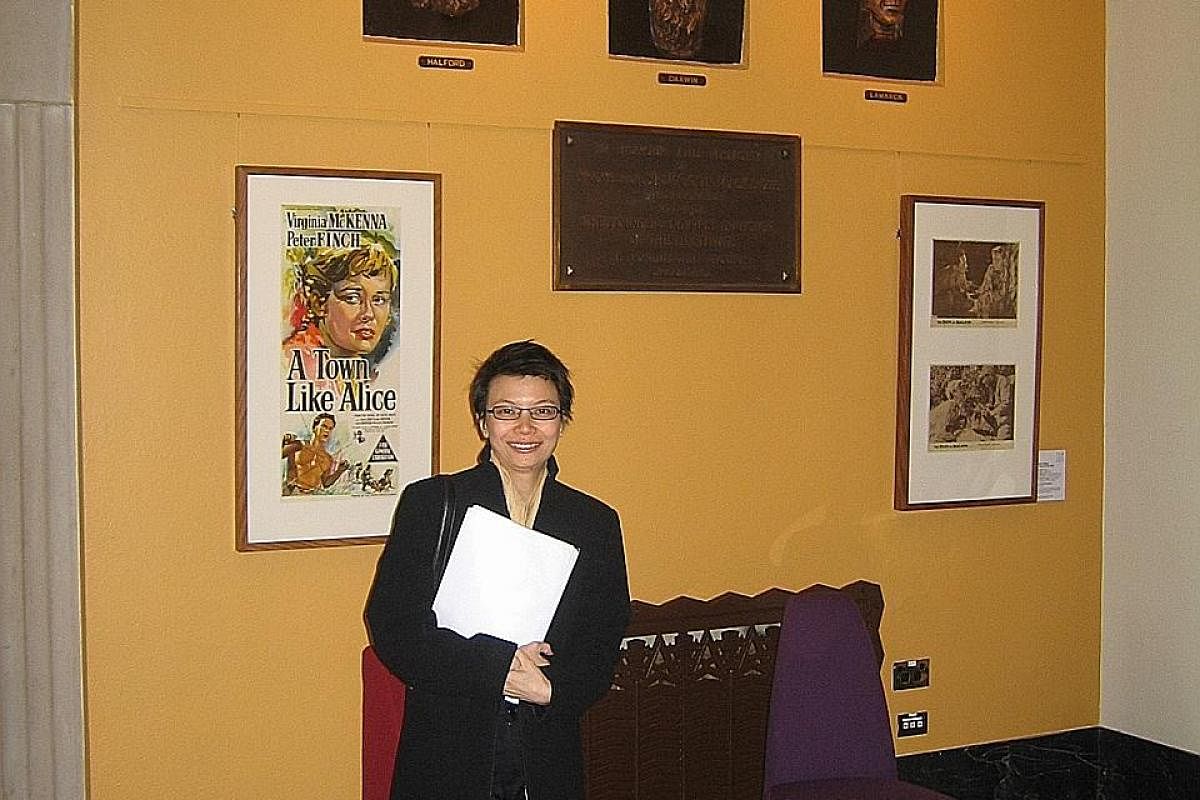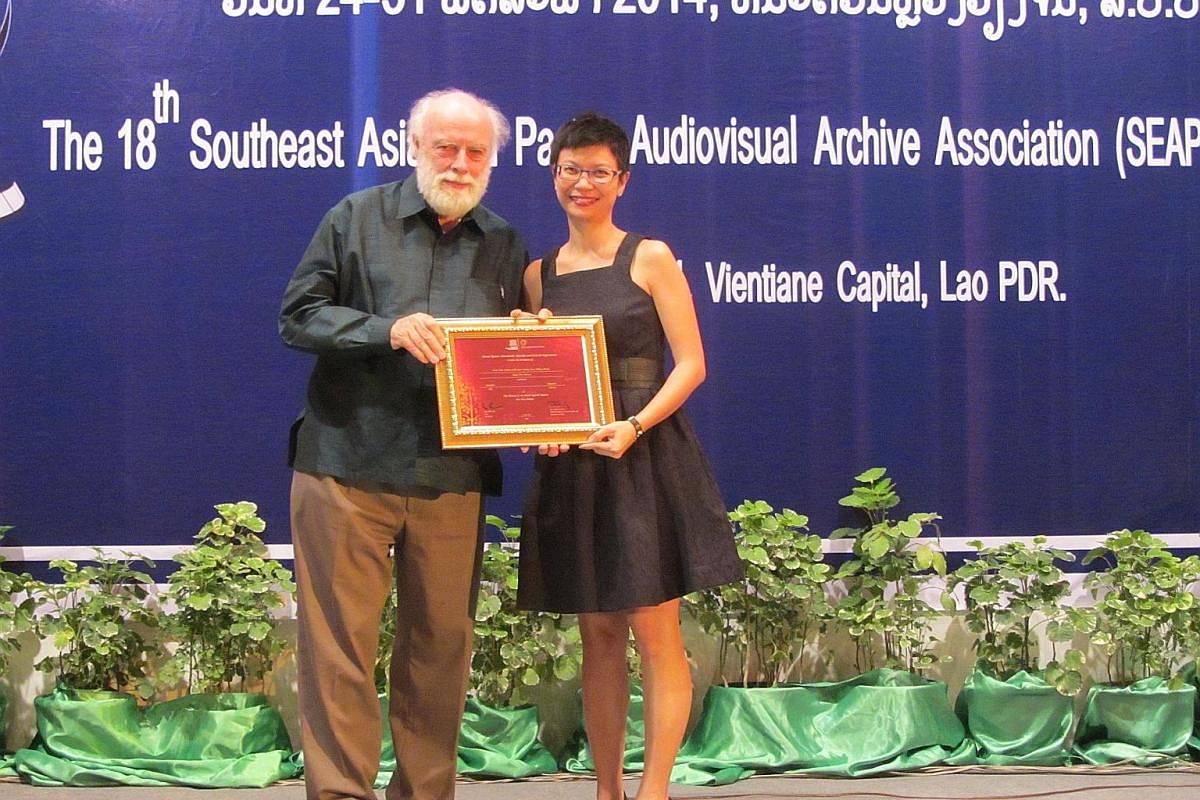The Life Interview With Karen Chan
The Life Interview With Karen Chan: Guardian of old films
The mission of Karen Chan, executive director of the Asian Film Archive, is to preserve old films, catalogue them and make them accessible to the public




In many ways, the story of the film The Lion City encapsulates why Ms Karen Chan does what she does.
The executive director of the Asian Film Archive (AFA) grows animated when she talks about the people who show up for screenings of the black-and-white romance, made in 1960.
"The last screening that we had - even though it was the umpteenth one - was packed. It was standing room," she says of the crowd at the free screening at library@chinatown.
How the film came to be shown there, to big crowds, is testament to the work of AFA, which located a print of the film, the first and only Chinese-language film made by Cathay-Keris Studio in post-war Singapore, from the Hong Kong Film Archive.
Then, using government funds, it made a clean, restored copy, with fresh English and Chinese subtitles.
The film, which was shot in Singapore, showed landmarks such as the first Housing Board flats, Mount Faber and Raffles Place.
That copy premiered as part of the SG50 series of film screenings and has since become a crowd favourite.
"The audience enjoy looking at all the sights of old Singapore and it's a simple story that they really like. It's an easy and entertaining escape for an hour and a half," says the 43-year-old.
The AFA has come a long way from when it took up a tutorial room at the National University of Singapore (NUS).
A year after its founding in 2005, Ms Chan, who had recently left her position as communications executive with the National Arts Council (NAC), joined the non-profit organisation as an unpaid volunteer.
Working alongside founder Tan Bee Thiam, she took on the role of archivist at the makeshift headquarters.
"I was taking time off after having my first child," she says, adding that she had long harboured a personal interest in hunting down and finding a home for older films.
Films were already arriving steadily from Singapore and around the region.
"My job was to grow the collection, to catalogue films. It was coming in tapes and reels," she says, adding that she often encountered tapes with a few films squeezed in, instead of just the one listed, because the sender wished to save money on media.
A lot has changed in 12 years.
For one thing, she is now the executive director of the AFA, a subsidiary of the National Library Board since 2014.
There are now six full-time employees on board, who archive, administer and organise outreach programmes for schools and the public, usually with the help of interns and trainees.
The organisation's main office is now at the National Library Building and there is a facility in Changi Business Park to process master copies, which, once converted to DVD format, are made available to the public at the library@ esplanade.
The precious master copies are preserved in a climate-controlled repository at the National Archives of Singapore.
In January this year, the AFA's flagship event, the State of Motion film and visual arts series, clocked an attendance of 6,918, a more-than three-fold increase from last year, because film screenings - 13 in all - were introduced. Next year's edition will be even more ambitious, promises the AFA.
Another of its events, the Asian Restored Classics series of screenings in August this year, attracted 2,000 people, a 15 per cent increase from its debut edition last year.
There is a hunger for films that speak to Asian heritage, just as there is a need to make sure that Asian films do not disappear just because there is no one to take care of ageing media, says Ms Chan.
The demand for a transnational centre for film archival was apparent from the start.
"In that first year, when we made an open call for films, within two weeks we had something like 350 titles coming in from around the region," she says.
That demand came from scholars and industry professionals who needed a central library of Asian works.
In fact, the idea of a central warehouse for historically important Asian films was hatched by Mr Tan for the same reason - after graduating from NUS in 2004, he found it difficult to find older Asian films and films made by independent film-makers in Asia.
In the early days, nothing could be taken for granted.
It was simple to convince outsiders about the value of film archival, which is the collection and cataloguing of films.
But to motivate film-makers to care about film preservation was a harder job.
"People instinctively supported the idea of a film archive, but film preservation was a backroom operation that few knew about and even fewer understood," she says.
Films, whether on celluloid reels, tape or other digital formats, come under attack from fungus and other agents of decay unless protected from heat and humidity.
"We had to raise awareness about what film preservation is, the reasons for the urgency of preserving films... and how much it cost."
Back then, AFA also had to persuade film-makers and distributors that it could be trusted with valuable and fragile film stock.
"We had to convince many of them to spend time locating their materials, providing data about their films and prioritising preservation work," she says.
It costs about $22,000 a year - an amount including repository costs, film cans and other supplies, manpower and transport - to preserve a film in 35mm format.
For a feature-length film on a digital format, the cost can be $112,000 a year.
Film-makers are not paid to deposit their films with the AFA, nor are they charged a fee and copyright still belongs to the film's owners.
That AFA has thrived and grown in the last 12 years Ms Chan credits to the tenacity of the early staff members, volunteers and interns, and financial and other support from private companies, foundations and especially public agencies such as the National Library Board, National Archives of Singapore, the Info-communication Media Development Authority of Singapore and NAC.
The AFA has 2,100 titles in its collection today.
Slightly more than half, about 55 per cent, are Singapore films while the rest come mainly from Malaysia, the Philippines and Indonesia.
A mere 5 per cent of titles are from other Asian nations, such as Myanmar, Laos, China and Thailand. AFA coordinates and shares resources with each nation's film archive organisation.
Preserving films for posterity
Within its vaults are 91 films made by Cathay-Keris Studio, the production house which, from the 1950s to the 1970s, made dozens of Malay-language films including works from popular directors such as M. Amin's drama Chu Chu Datok Merah (1963); Hussain Haniff's period drama Dang Anom (1962); L. Krishnan's fairy tale Bawang Merah, Bawang Puteh (1959); and Mat Sentul's spoof on James Bond, Mat Bond (1967).
These films have been officially listed with the Unesco's Memory Of The World Asia-Pacific Regional Register.
All that cost and effort enables AFA to fulfil the other part of its mission, which is to ensure that films are made publicly accessible, says Ms Chan.
The organisation holds film screenings, tours, talks, workshops and exhibitions, and releases special publications such as Blu-ray videos and books.
Most events are free, but the occasional ticketed event helps to defray a small portion of costs.
It all began in 2004, when AFA founder and former executive director Tan was a freshly minted graduate in electrical and computer engineering with a passion for films.
He tells the Straits Times that when he was a student, he had missed film festival screenings because they clashed with his exams. When he tried to find the films on his own, he would often be frustrated.
"I realised most of the films were kept in cupboards and under the beds of film-makers," he says.
A year of exchange studies in the United States showed him the power of grassroots-driven organisations.
Inspired, he applied what he saw to film archival.
"I wanted to preserve them so people like me and future generations can get to enjoy these cinematic treasures," says Mr Tan, 39.
He says that when Ms Chan joined, he "couldn't have asked for a better partner to save, explore and share the art of Asian cinema".
"Karen is a natural archivist. She's meticulous and has an eye for details; a never-say-die attitude, refusing to give up on each orphan film that lands on her desk; and is innovative to always push the outreach programmes."
He stepped down as executive director of the AFA in 2010 to focus on teaching and making films. Ms Chan took over, but he is still a volunteer.
Ms Han Minli, director of cinema operator FilmGarde, has known Ms Chan for a decade, after her company began collaborating with AFA on events.
"It's great to see how far they have come," says Ms Han, who is in her 30s. "Karen and her team pressed forward, keeping their chins up even when they faced multiple rejections."
The youngest of three children, Ms Chan grew up in Opera Estate and went to Opera Estate Girls' School and Temasek Secondary School.
Her father was a civil servant and her mother worked in insurance.
Her paternal grandfather imported records and her home was filled with the sound of English-language songs.
Next came the University of Western Australia, where she majored in English and history.
On her return, she taught both subjects at a secondary school, but found the rigid adherence to syllabus stifling - the experience was "torturous" for both student and teacher, she says.
In 1998, the National Archives needed archivists for its recently formed audio-visual archiving unit.
She jumped at the chance to put her love of history to use. That work was put on hold when her husband, an auditor, was posted to New York.
She volunteered at the Natural History Museum of New York, where she stayed for over two years as an archivist.
Once back in Singapore, she joined the NAC, working in public relations and marketing. Then, from a friend, she heard about Mr Tan's year-old film archival project and volunteered there.
"I realised after working in several places that archiving is what I enjoyed, the work that made me feel that I was preserving something for posterity," says the mother of two boys aged 13 and nine.
Some of the most satisfying moments in her work happen when old classics are screened to an eager audience.
AFA's free screenings in public libraries get "amazing" turnouts, she says, especially when Chinese dialect operas, that fans would otherwise never get to see, are screened.
"They were so keen to see a dialect opera, but put on film.
"There are films that you never think would attract an audience, but they do."
Join ST's Telegram channel and get the latest breaking news delivered to you.
A version of this article appeared in the print edition of The Straits Times on November 13, 2017, with the headline The Life Interview With Karen Chan: Guardian of old films. Subscribe

